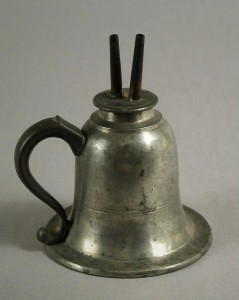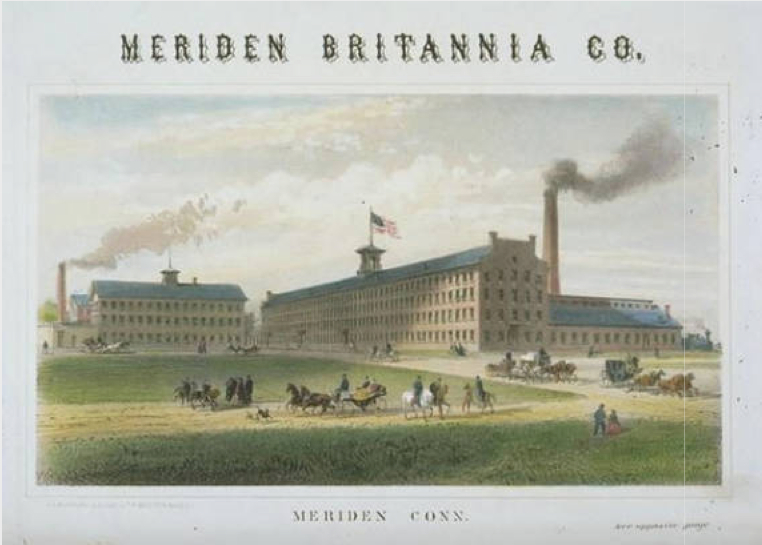Like many towns in central Connecticut that found sustaining an agricultural economy difficult, Meriden had become a manufacturing town by the mid-19th century. Despite large numbers of local industries going out of business by the start of the Civil War, two former peddlers, Horace and Dennis Wilcox, helped establish a lucrative silver industry in Meriden. Bringing together numerous local manufacturers and distributors, the two entrepreneurs formed the Meriden Britannia Company in 1852.
Britannia is a metal similar to pewter, only with a more lustrous and silvery sheen. By the end of the 1700s, English craftsmen had perfected its manufacture and were exporting it to America where it quickly caught on as an affordable substitute for silver in household products. Britannia was thinner and stronger than pewter, making it more affordable to manufacture, and its resistance to tarnishing made it popular with American consumers.

Cast Britannia metal whale oil lamp, maker unknown – Connecticut Historical Society
Later in the 1800s, as the popularity of Britannia started to fade, the Meriden Britannia Company began coating their products in silver through an electro-plating process that kept them at the forefront of their industry. More than just providing the materials necessary for the fabrication of household goods, the Meriden Britannia Company manufactured products of its own. They sold ship lamps (a popular item in New England coastal towns) as well as “fancy bar tobacco boxes” and other household goods. By 1860 they employed 320 workers and had positioned themselves to become a part of one the largest and most prestigious silver companies of the era.
The International Silver Company formed on November 19, 1898. It immediately bought and merged together the operations of numerous silver goods manufacturers—most of them from Connecticut. These manufacturers included the Barbour Silver Company of Hartford, the Holmes & Edwards Silver Company of Bridgeport, Rogers and Brothers of Waterbury, the Watrous Manufacturing Company of Wallingford, and the Meriden Britannia Company. Making its headquarters in Meriden, the International Silver Company became the major producer of silver products in the United States and earned Meriden the nickname of “The Silver City.”
In the 1950s, in response to overseas competition, the firm further diversified its metalwork beyond silver and expanded its Meriden facilities. In 1969, the company, now called Insilco Corporation, branched out into electronics, automotive components, office products and other areas. As for its International Silver Company subsidiary, low-priced imports, rising silver prices, and shifting consumer preferences led to a shrinking market for silverware. Insilco reoriented some International Silver facilities to other purposes and eventually sold the subsidiary. By 1984, silverware production in Meriden came to a close.









